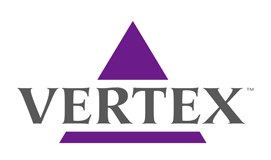CF Drug Developer Vertex Announces Positive Results from Phase 2 Trial of VX-661

 Adding to the excitement of Vertex Pharmaceuticals Inc.‘s new orphan drug status of VX-661 is the announcement of the results of Vertex’s Phase 2 clinical study of VX-661 with KALYDECO (ivacaftor) in cystic fibrosis patients heterozygous for the 508del and G551D mutations. Recruited patients received treatment for 28 days with VX-661 and KALYDECO and saw a significant improvement in lung function and reduced sweat chloride levels.
Adding to the excitement of Vertex Pharmaceuticals Inc.‘s new orphan drug status of VX-661 is the announcement of the results of Vertex’s Phase 2 clinical study of VX-661 with KALYDECO (ivacaftor) in cystic fibrosis patients heterozygous for the 508del and G551D mutations. Recruited patients received treatment for 28 days with VX-661 and KALYDECO and saw a significant improvement in lung function and reduced sweat chloride levels.
The data are impactful because this is the first proof-of-concept study to demonstrate the added benefit of a cystic fibrosis transmembrane conductance regulator (CFTR) corrector to an established cystic fibrosis treatment in patients with a mutation common to cystic fibrosis patients. The study stemmed from in vitro observations that VX-661 enhances CFTR function in human bronchial epithelial cells with the same mutations.
“Consistent with observations from in vitro studies, these results provide an important proof-of-concept for the use of VX-661 in combination with KALYDECO to provide the potential for further benefit in people already being treated with KALYDECO alone who have one F508del mutation and another mutation known to respond to  KALYDECO alone,” said Jeffrey Chodakewitz, M.D., Senior Vice President and Chief Medical Officer at Vertex in a press release. “While this study was small and evaluated the combination regimen for only four weeks, it provided important scientific evidence that we continue to make progress toward our goal of helping more people with CF and enhancing the benefit our medicines may provide. We look forward to further evaluation of this regimen to better understand the role that VX-661 and KALYDECO may play in the treatment of people with CF.”
KALYDECO alone,” said Jeffrey Chodakewitz, M.D., Senior Vice President and Chief Medical Officer at Vertex in a press release. “While this study was small and evaluated the combination regimen for only four weeks, it provided important scientific evidence that we continue to make progress toward our goal of helping more people with CF and enhancing the benefit our medicines may provide. We look forward to further evaluation of this regimen to better understand the role that VX-661 and KALYDECO may play in the treatment of people with CF.”
To be eligible to participate in the study, cystic fibrosis patients heterozygous for the 508del and G551D mutations needed to have received KALYDECO treatment for at least four weeks prior to inclusion; the average time of treatment was one year. Patients were randomized into two groups, with one group receiving placebo and the other receiving VX-661. All 18 enrolled patients completed the study and tolerated treatment with limited adverse events of cough, pulmonary exacerbation, headache, and upper respiratory tract infection. The 14 patients who received VX-661 saw a mean change in lung function of +7.3% relative to baseline upon the end of treatment and a mean change in sweat chloride of -7.02 mmol/L. These benefits were largely ablated four weeks following the end of treatment, providing strong evidence that VX-661 was responsible for the improvements.
[adrotate group=”1″]
To confirm a long-term benefit of VX-661, additional studies of longer duration must be conducted. Vertex has already begun a 12-week study of cystic fibrosis patients homozygous for the F508del mutation receiving VX-661 in combination with ivacaftor. This study, as well as the study described herein, has prompted Vertex to discuss with global regulatory authorities the approval of VX-661 in combination with KALYDECO to treat cystic fibrosis patients. So far, KALYDECO has been approved for use in cystic fibrosis patients with the G551D, G178R, S549N, S549R, G551S, G1244E, S1251N, S1255P, and G1349D mutations. It is the first medicine to treat the cause of cystic fibrosis: a dysfunctional CFTR. KALYDECO is a CFTR potentiator that allows the CFTR to function more normally to hydrate and clear mucus from the airways.
Lung infections for CF patients can be deadly. Read about how [adrotate banner=”12″] can help!







